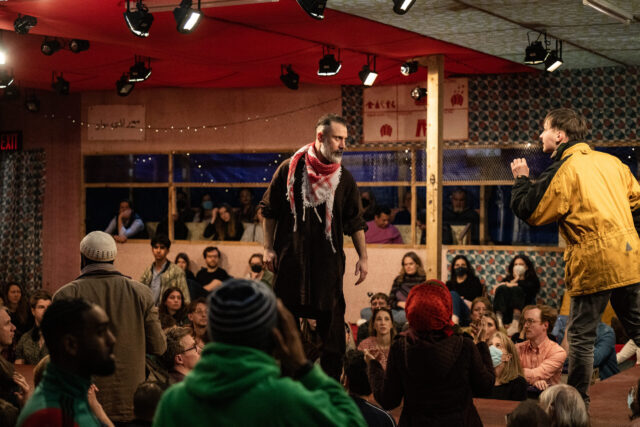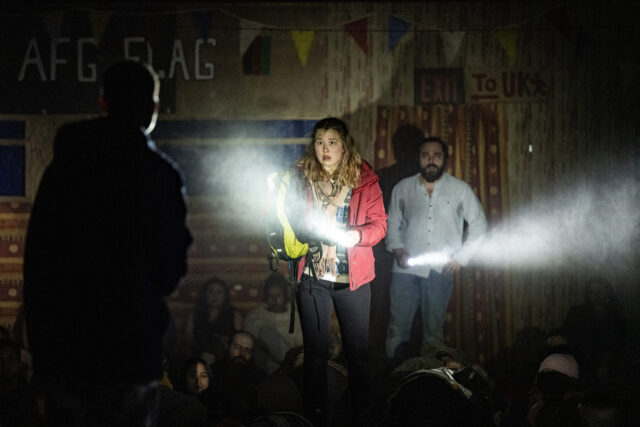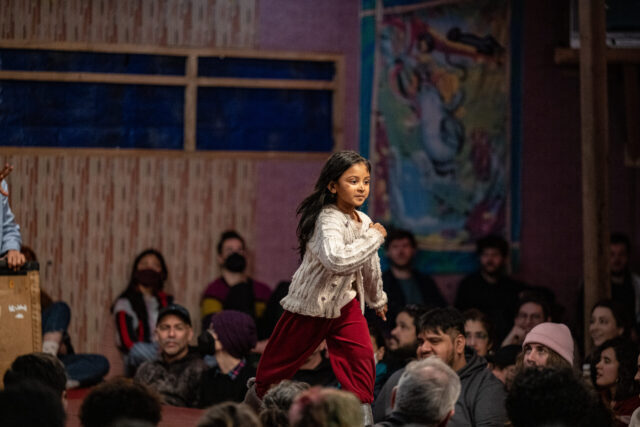
Salar (Ben Turner) makes his case to Sam (Jonathan Case) in The Jungle (photo by Teddy Wolff)
THE JUNGLE
St. Ann’s Warehouse
45 Water St.
Through March 19, $39-$149
718-254-8779
stannswarehouse.org
www.goodchance.org.uk
Amid an ever-growing global immigration crisis, Joe Murphy and Joe Robertson’s bold, breathtaking The Jungle makes a triumphant return to St. Ann’s Warehouse before heading to Washington, DC. It’s political theater of the highest order, avoiding preaching while immersing audiences in all-too-real and frightening situations.
In 2015, Murphy and Robertson visited the Calais Jungle, a makeshift refugee camp where thousands of men, women, and children temporarily lived, erected on a former landfill. Over their seven months at the site, they helped construct a geodesic dome where the people could gather as a community and present plays and poetry. The two writers document the story in The Jungle, which ran at St. Ann’s in 2018–19 but had to delay its encore engagement, scheduled for March 2020, because of the coronavirus pandemic. But it’s now back, and it’s as thrilling as it is heart-wrenching.
St. Ann’s has transformed itself into Zhangal, or the Jungle, with geographical markers, the Good Chance Dome (filled with photographs and artwork from camp residents), tents, graffiti, and a re-creation of Salar’s (Ben Turner) restaurant, which actually received a starred review from food critic AA Gill in the Sunday Times. The large central area features long communal tables and an interconnected series of raised platforms; the diverse cast of twenty-two (some of whom were migrants themselves) weave in and out of the audience, which is seated in sections designated by the countries the refugees escaped from. The framing premise is that we are all attending an emergency meeting “to talk about another proposed eviction of the Jungle.” The narrative then unfolds in flashback.

Beth (Liv Hill) and Safi (Ammar Haj Ahmad) try to help Okot (Rudolphe Mdlongwa) in immersive show at St. Ann’s (photo by Teddy Wolff)
“When does a place become a place?” asks the Aleppo-born Safi (Ammar Haj Ahmad), one of the leaders of the camp and the show’s narrator. “By November in the Jungle I could walk from Sudan through Palestine and Syria, pop into a Pakistani café on Oxford Street near Egypt, buy new shoes from the marketplace, Belgian cigarettes from an Iraqi cornershop, through Somalia, hot naan from the Kurdish baker, passing dentists, Eritrea, distribution points, Kuwait, hairdressers and legal centers, turn right onto François Hollande Street, turn left onto David Cameron’s Avenue, stop at the sauna, catch a play in the theater, service at the church, khutba in a mosque, before arriving at Salar’s restaurant in Afghanistan.” He then poignantly adds, “When does a place become home?”
The dome is named the Good Chance because the refugees believe they have a “good chance” of making it to the promised land, England, either via boat or truck, often arranged by Ali (Waleed Elgadi), a smuggler who charges exorbitant rates for his services. Several Caucasian British citizens work at the camp to help the migrants: Derek (Dominic Rowan), who almost always carries a clipboard with him, trying to organize things; Beth (Liv Hill), who pours her heart and soul into the camp; Paula (Julie Hesmondhalgh), who takes a more practical approach; and Sam (Jonathan Case), who is committed to build as many housing shelters as possible.
They treat the people of the Jungle with dignity, but there are limits to what they can accomplish. They also have the option at any time to go back to their homes, a choice not available to the migrants, who have left because of violence, extreme poverty, religious persecution, military juntas, and other reasons, seeking a better, safer life in the west.

Amal (Aisha Simone Baez) seeks a new life filled with hope and promise in The Jungle at St. Ann’s (photo by Teddy Wolff)
Among the key subplots are Okot’s (Rudolphe Mdlongwa) attempt to be smuggled into London; a deal between French journalist Henri (Max Geller) and Sam to exchange important information; the bitter Norullah’s (Twana Omer) racism; the plight of the adorable Amal (alternately Aisha Simone Baez or Annabelle Tural), a nine-year-old girl from Syria who has been separated from her family; and Salar’s refusal to let his restaurant be torn down when the French government announces that the southern half of the camp will be evicted. Boxer (Pearce Quigley) and Helene (Mylène Gomera) sing; Omar (Mohamed Sarrar) plays the drums; Amin (Habib Djemil) performs daring gymnastics; Maz (Fedrat Sadat) is desperate to get out. Amid all the horror and pain, the ragtag community still finds ways to celebrate life and their unique heritages through music, dance, food, and clothing.
“Great is the hope that makes man cross borders. Greater is the hope that keeps us alive,” Safi says.
Miriam Buether’s set, which extends into the garden outside St. Ann’s, also includes flags, a working kitchen, wall hangings, and other deft touches; there’s a ketchup bottle on every table, but don’t expect to get anything to eat. Catherine Kodicek’s costumes alternate between functional and traditional, highlighting the similarities and differences among the nations. The lighting by Jon Clark and sound by Paul Arditti further immerse the audience into the Jungle, especially at night when the characters use flashlights and whisper in the darkness. The music, ranging from celebratory to mysterious, is by John Pfumojena, with video by Tristan Shepherd and Duncan McLean of real-life news reports projected on several small monitors, instilling a chilling dose of reality.
The cast is extraordinary, embodying the fear that the refugees experience on a daily basis, never knowing what tomorrow might bring. Turner is bold and defiant as Salar, a man who has lost nearly everything but refuses to surrender his restaurant. Haj Ahmad is cool and calm as Safi, who is desperately trying to hold things together but knows it might be a lost cause. Hill excels as the emotionally involved Beth, who represents rescue workers who invest so much of themselves to save others. Omer is stalwart as Norullah, who is balancing that fine line between wanting to escape to England and doing the best one can in the meantime. And Baez is delightful as the little girl who can’t help but smile as chaos surrounds her.
Directors Stephen Daldry (Skylight, Billy Elliot) — who has won two Emmys, an Olivier, and three Tonys and has been nominated for three Oscars — and Justin Martin (Low Level Panic, Prima Facie), who previously collaborated on the 2021 pandemic film Together and are used to working with proscenium stages, do a marvelous job orchestrating the nonstop action, maintaining a furious pace as the injustice builds over nearly three hours (with one intermission). Murphy and Robertson’s dialogue is distinct and powerful, creating well-drawn characters who will touch your soul.
A program insert contains information about how to donate to Good Chance Theatre and the Brooklyn Community Foundation’s Immigrant Rights Fund as well as additional resources about immigration services. (The show is a coproduction of the National Theatre and the Young Vic with Good Chance.)
The artistic directors of Good Chance, Murphy and Robertson also turned the young girl in The Jungle into Little Amal, a twelve-foot-tall puppet that traveled around the world in The Walk, spreading her message about refugees: “Don’t forget about us.” It’s impossible to forget about Little Amal, just as it’s impossible to forget about The Jungle.